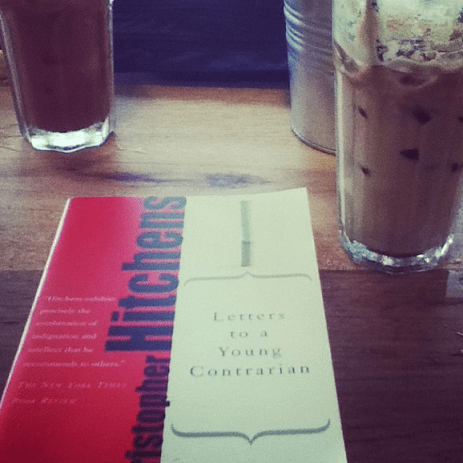Learnings from ‘Letters to a Young Contrarian’
Contrarian: [adjective] Opposing or rejecting popular opinion or current practice. Other similar expressions include: rebel, revolutionist, maverick, elitist.
Christopher Hitchens in his book, ‘Letters to a Young Contrarian’, addresses the concerns of an imaginary student who asks, “How a radical or contrarian life may be lived?”
Written as a one-sided-dialogue and part-argument prose, Hitchens puts forward several ideas and themes which at some point or other, would have crossed our minds — from indoctrination of religion, one’s purpose in life, the existence of an inherent good in humans, the correlation between humour and intelligence and many other thought-provoking issues which are spread across 18 “letters”/chapters.
The author’s breadth of knowledge in the teachings of various philosophers and political activists (George Orwell, Zola, Karl Marx, Thomas Paine… to name a few), are evident throughout the book as he uses their ideas to supplement his arguments in addition to entertaining personal life experiences. A similar working knowledge would no doubt be useful to the reader to comprehend Hitchens’ writings in greater depth, although this is not completely necessary.
All through our life, we have been taught that there has always been a “right” and a “wrong”. Our education system, the media, and society in itself has spoon-fed us with the idea that things must be done in a particular manner; anything otherwise would be deemed as strange, out-of-the-norm, weird. Going against popular societal beliefs would label us a rebel.
Hitchens is gratifying in this sense. He tells us that we should be rebels. Why? Because, “the essence of the independent mind lies in not what it thinks, but in how it thinks.” What virtue is there if our beliefs or principles are in existence simply because it has been put there in place by someone else? It is akin to sitting for an exam whereby the examiner has given you the answers beforehand — if you score well, does it actually reflect your efforts?
A person’s intellect then is tested not simply because of what the person believes in (the end result), but the manner in which he/she has come to that conclusion (the process). Hitchens then points out several criteria which a “contrarian” or rebel would have.

Inspired by these thoughts, yours truly will now attempt to guide you on how to begin to think like a rebel in three simple steps as explained below:
(1) Identify yourself
“To be in opposition is not to be a nihilist. And there is no decent or charted way of making a living at it. It is something you are, and not something you do.”
For a budding revolutionist, it is easy to identify with figures of opposition. Hitchens uses Emile Zola as an example whilst popular freedom fighters such as Gandhi or Martin Luther King would most certainly pop into our heads. Put into a more local context, Anwar Ibrahim wouldn’t be far from our thoughts if we had to think of an “opposition” figure.
Now, the potential rebel (you) must ask whether you recognize something of yourself in the same instance as those mentioned above: a disposition to resistance against arbitrary authority or witless mass opinion, or a thrill of recognition when you encounter some well-wrought phrase from an intellectual.
Do you feel that there is not quite right with simply accepting authority because everyone tells you so?
Do you feel the need to question how a popular way of behaving became popular in the first place?
If your answer is in the affirmative, then congratulations. You’ve passed the first step.
The essence of a rebel must come from within, it is a characteristic that translates into a lifestyle and therefore into tangible actions.
Action by itself does not make you a rebel.
(2) Question the world
“Try your hardest to combat atrophy and routine. To question The Obvious”
George Orwell once said that very often, the hardest thing to see is what is right in front of your nose. It goes without saying that humans take things for granted. I do. You do. We all do, really.
See, once we become so used to a particular state of things, we naturally become de-sensitized. And then we stop questioning the reason why the situation was as such, and we simply accept it.
Here, Hitchens uses the innocence of a child as an example — pointing out that although children make easy targets for indoctrination, in societies infected by the poison of racism, it has often been children who have set an example via the simple gesture of asking the obvious — “Mummy, why do we not like that man?”
The act of questioning will then ignite your thought process and it is here that your quest for answers begin. You will find yourself dissatisfied with shallow answers that merely scrape the surface and long for a deeper, more thoughtful solution to questions that come your way.
Where once you would have answered that one’s purpose in life is to find happiness, perhaps now you would question what happiness is.
(3) Doubt what you’ve learnt
“For the dissenter, the skeptical mentality is at least as important as any armor of principle.”
When asked to give his favourite epigram, Karl Marx offered this: de omnibus disputandum (“everything must be doubted”).
Hitchens warns us against being like perfectionists and zealots who can break but never bend. A rebel must never be too proud to think that he is a 100% right, for to do so would only lead to a clouded and bias mind… and therefore a life of illusion.
John Stuart Mill further reminds us that even if we all agreed on an essential proposition, it would be prudent to listen to the minority opinion – lest we forget how to justify our original argument. Thus, even after you have found a solution, you should realize that that solution may not hold true over time and it is still open for discourse.
On a personal note, I find it prudent to always leave a gap in your answers because most things aren’t set in stone.
The absolute truth is one that is elusive and often times (especially with subjective questions dependent on an individual’s personal belief) the “right” answer is one that is in several shades of grey.
What is right to one person, may be wrong to another and conversely.
There you go.
Embrace these three steps as part of your lifestyle, and you’re on your way to leading your own life revolution.
Ignite the passion within, question what you know, doubt what you find.
Sha-Lyn is often disturbed when encountering people who tend to judge and accept things at face value. She also feels that people would perhaps be less confused and experience less hurt in life if they took more time to dwell deeply before acting.


If you like Hitchens, you should read "God is not great: How religion poisons everything".